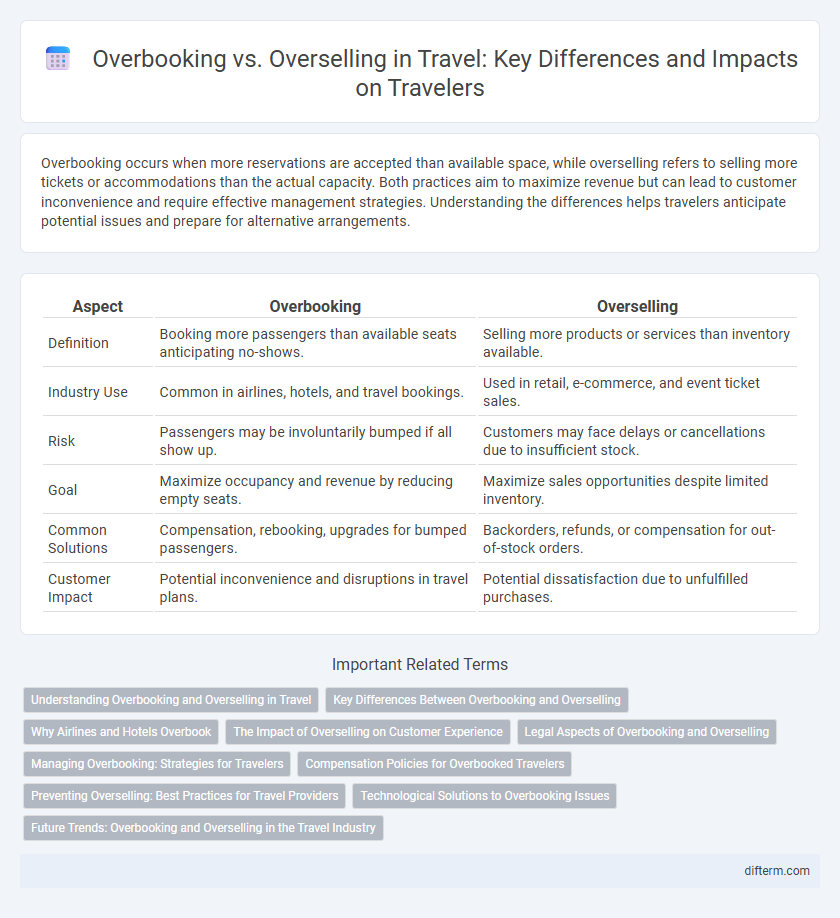Overbooking occurs when more reservations are accepted than available space, while overselling refers to selling more tickets or accommodations than the actual capacity. Both practices aim to maximize revenue but can lead to customer inconvenience and require effective management strategies. Understanding the differences helps travelers anticipate potential issues and prepare for alternative arrangements.
Table of Comparison
| Aspect | Overbooking | Overselling |
|---|---|---|
| Definition | Booking more passengers than available seats anticipating no-shows. | Selling more products or services than inventory available. |
| Industry Use | Common in airlines, hotels, and travel bookings. | Used in retail, e-commerce, and event ticket sales. |
| Risk | Passengers may be involuntarily bumped if all show up. | Customers may face delays or cancellations due to insufficient stock. |
| Goal | Maximize occupancy and revenue by reducing empty seats. | Maximize sales opportunities despite limited inventory. |
| Common Solutions | Compensation, rebooking, upgrades for bumped passengers. | Backorders, refunds, or compensation for out-of-stock orders. |
| Customer Impact | Potential inconvenience and disruptions in travel plans. | Potential dissatisfaction due to unfulfilled purchases. |
Understanding Overbooking and Overselling in Travel
Overbooking in travel occurs when airlines or hotels sell more reservations than available seats or rooms, anticipating some cancellations or no-shows. Overselling refers to the practice of promoting and selling excess inventory beyond actual capacity to maximize revenue, often leading to conflicts if demand exceeds supply. Proper management of these strategies balances profitability while minimizing customer inconvenience and reputational damage.
Key Differences Between Overbooking and Overselling
Overbooking occurs when an airline or hotel accepts more reservations than available capacity based on the statistical likelihood of no-shows, while overselling refers to selling more tickets or rooms than the total physical capacity, often due to inventory system errors or aggressive sales strategies. A key difference lies in the intent: overbooking is a calculated risk to maximize occupancy, whereas overselling is generally unintentional or a result of mismanagement. Understanding these distinctions helps travelers anticipate potential issues like denied boarding or accommodation shortages.
Why Airlines and Hotels Overbook
Airlines and hotels overbook to maximize revenue by compensating for no-shows and last-minute cancellations, ensuring full capacity utilization. This practice helps maintain profitability despite fluctuating demand and unpredictable customer behavior. Overbooking reduces the risk of empty seats or rooms, which represent lost income for these businesses.
The Impact of Overselling on Customer Experience
Overselling in travel leads to a negative customer experience by causing involuntary denied boarding, resulting in delays and disruption to travel plans. Airlines that frequently practice overselling risk damaging their reputation and losing customer loyalty due to the frustration and inconvenience passengers face. Effective management of booking limits and clear communication can help mitigate the detrimental effects of overselling on passenger satisfaction.
Legal Aspects of Overbooking and Overselling
Legal aspects of overbooking and overselling in travel involve regulations designed to protect passengers from denied boarding and ensure fair compensation. Airlines must comply with rules set by authorities like the U.S. Department of Transportation and the European Union Aviation Safety Agency, which require disclosure of overbooking policies and mandatory passenger compensation in cases of involuntary denial of boarding. Contractual obligations between airlines and passengers, framed within international treaties such as the Montreal Convention, further dictate liabilities and legal recourse for travelers affected by overbooking or overselling practices.
Managing Overbooking: Strategies for Travelers
Travelers facing overbooking issues can minimize disruption by confirming reservations directly with airlines 24 to 48 hours before departure and arriving early at the airport to increase chances of voluntary rebooking. Utilizing travel insurance with coverage for trip interruptions ensures financial protection if involuntary bumping occurs. Keeping alternative flights and accommodations planned in advance allows seamless adjustments in case of overselling-induced cancellations.
Compensation Policies for Overbooked Travelers
Compensation policies for overbooked travelers vary by airline but often include cash payments, travel vouchers, and meal or hotel accommodations to mitigate inconvenience. Regulations such as the U.S. Department of Transportation's Rule 14 CFR Part 250 require airlines to provide specific compensation amounts when passengers are involuntarily bumped due to overbooking. Understanding these policies helps travelers claim appropriate reimbursements and avoid unexpected expenses during disrupted travel plans.
Preventing Overselling: Best Practices for Travel Providers
Implementing real-time inventory management systems is crucial for preventing overselling in the travel industry. Travel providers should integrate automated reservation updates to accurately reflect seat or room availability, reducing the risk of overbooking. Regularly training staff on demand forecasting and cancellation trends further ensures optimized capacity management and enhanced customer satisfaction.
Technological Solutions to Overbooking Issues
Technological solutions to overbooking issues leverage advanced algorithms and artificial intelligence to predict no-show rates and optimize booking levels accurately. Airlines and hotels implement dynamic pricing models and real-time data analytics to balance inventory and minimize customer inconvenience. Automated communication systems notify affected travelers promptly, offering rebooking options and compensation to enhance customer satisfaction.
Future Trends: Overbooking and Overselling in the Travel Industry
Future trends in the travel industry indicate a shift towards advanced AI-driven analytics to better predict passenger behavior, reducing the reliance on traditional overbooking and overselling practices. Airlines and hotels are increasingly adopting dynamic inventory management systems that optimize capacity without compromising customer satisfaction. Enhanced transparency and personalized offers aim to balance revenue maximization with improved passenger experience in evolving market conditions.
overbooking vs overselling Infographic

 difterm.com
difterm.com